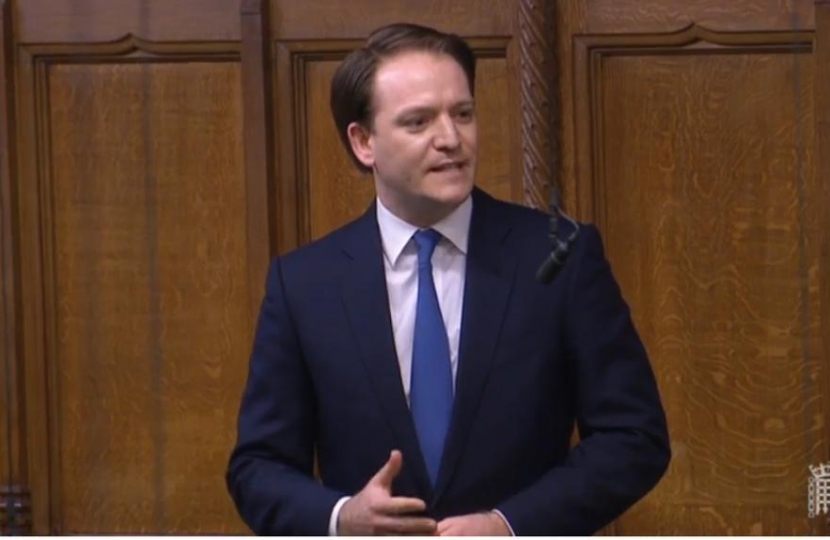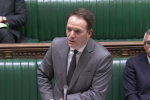
Grantham and Stamford MP Gareth Davies used his speech in Wednesday’s Budget Day debate in the House of Commons to highlight the importance of sound public finances and the fact that workers and small businesses will drive the economic recovery.
Addressing the House, Gareth said:
“Our economic recovery will not be driven from the floor of this House of Commons. It will be driven from the factory floors of Grantham and the shop floors of Stamford. It will be driven by workers and small businesses, not politicians. But we can provide stability and certainty through management of our public finances.”
Mr Davies focused on the benefits which boosting the skills of young people could bring to the area, using the Grantham-based engineering firm Iconic Engineering Solutions as an example of a business which can benefit from having more technical workers available in the jobs market.
More broadly, local engineering firms are set to benefit from £3,000 incentive payments to take on apprentices and £126 million to triple the number of traineeships next year, enabling some of Grantham’s largest employers to draw on local talent and grow their businesses.
In addition, the Chancellor announced a series of measures to continue support for those businesses still under restrictions.
Commenting, Gareth Davies said:
‘Today’s Budget provides businesses and families in Grantham and Stamford with the vital support and reassurance they need to get through the coming months of this awful pandemic.
“I was particularly pleased to see that VAT for hospitality and tourism businesses will continue to be reduced at 5% for the next 6 months and that the planned increases in alcohol duties will all be cancelled. These measures, together with the Restart Grants, which will provide up to £18,000 in new grants for hospitality and the extension to the 100% business rate holiday will help those businesses that have had to close endure the coming months as we work our way towards re-opening our economy.”
The Chancellor also set out plans for boosting infrastructure investments through the new National Infrastructure Bank. On this Mr Davies said in his speech:
“The National Infrastructure Bank will help mobilise billions of pounds of private capital to help fuel new investments in energy and transportation infrastructure”
The Government has detailed all measures on the following website: https://www.gov.uk/government/news/budget-2021-what-you-need-to-know
SUMMARY OF MAIN ANNOUNCEMENTS:
- The furlough scheme, due to end in April, has now been extended in its current form until the end of June – the point at which the Prime Minister hopes to remove all remaining restrictions on social distancing. The scheme will continue to run until the end of September, with incremental obligations on employers to pay a bigger share of wages from June.
- Sizeable grants for the self-employed have been extended and will continue until September. This means that the Government will cover up to 80% of the monthly profits up to a maximum of £2,500 a month. People self-employed from the 2019-20 tax year will be included in the grant scheme, supporting an additional 600,000 people.
- The £20-a-week uplift to universal credit has been extended by 6 months. The National Living Wage will also increase to £8.91 from April and extend to those over the age of 23 – equivalent to almost a £350 pay rise.
- Personal tax thresholds will be frozen from next year until 2026, meaning that take-home pay in cash terms will not fall.
- The stamp duty cut will be extended. To avoid purchases not completing in time for the end of March, the £500,000 nil rate band will end on 30 June, before tapering down to £250,000 until the end of September and returning to the normal level from 1 October. In addition, lenders who commit to providing loan-to-value rations between 91 and 95% can get a government guarantee on the full value of mortgages.
The Chancellor has also announced an extensive package of business support.
- The business rates holiday has been extended through to the end of June. For the remaining 9 months of the year, business rates will still be discounted by two thirds. This is a £6 billion tax cut for business.
- A new fund of £5 billion is now available to help pubs, restaurants, hairdressers and shops to reopen. It is estimated that this will apply to over 700,000 businesses, running in addition to the £20bn worth of support already provided to businesses during this pandemic.
- New Recovery Loans will replace the existing loan schemes. Our schemes have provided £70bn of support to 1.5 million companies. But as these come to an end, a New Recovery Loan will take their place: loans from £25,000 up to £10 million, with an 80% government guarantee.
- To protect the 150,000 hospitality and tourism businesses which employ around 2.4 million jobs and have undoutedbly been hardest hit, the 5% reduced rate of VAT has been extended for a further 6 months until the end of September. Normal rates will not return until April 2022. That is an overall tax cut of £5 billion next year.
- £700 million has been pledged to support local and national arts, culture and sports institutions as they reopen. A new apprenticeship scheme for creative industries will be piloted and and an extension of the £500mn Film and TV Production Insurance Restart Scheme will be extended.
- This additional support is welcome news and possible only because of the prudence of successive Conservative governments and sustainable management of our public finances for over a decade.
- And the plan is working. The independent Office for Budget Responsibility now expects that the UK economy will recover to its pre-crisis level six months earlier than originally thought – the second quarter of 2022, instead of the fourth. And unemployment is now expected to peak at 6.5% instead of nearly 12% feared last summer.
- That said, the Chancellor made clear the importance of being honest about the need to fix public finances. Without further action, borrowing would remain high and debt would rise indefinitely.

